|
|
|
Sort Order |
|
|
|
Items / Page
|
|
|
|
|
|
|
| Srl | Item |
| 1 |
ID:
155770
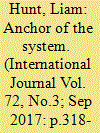

|
|
|
|
|
| Summary/Abstract |
American nuclear diplomacy generally presents a set of explanatory conditions ripe for the political realist: rogue states, an alarmed public, and existential risk create a milieu apt for realpolitik. This case study closely examines the link between the Joint Comprehensive Plan of Action and the theoretical trends in United States foreign policy, specifically with respect to the dictates of neorealism. At the time of writing, the bulk of literature on the Joint Comprehensive Plan of Action and its consequent developments remains lacking in theoretical commentary on how the agreement relates to broader narratives of United States foreign policy. This essay bridges the gap in the literature by drawing a connection between the Iran nuclear deal, neorealism, and liberal institutionalism. The findings suggest that the Joint Comprehensive Plan of Action marks a significant deviation from the predictions of realism, instead acting as an example of liberal institutionalism and potentially signalling a greater shift toward multilateralism in United States foreign policy.
|
|
|
|
|
|
|
|
|
|
|
|
|
|
|
|
| 2 |
ID:
155773
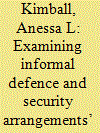

|
|
|
|
|
| Summary/Abstract |
This article presents and examines a model of legalization on an original dataset of informal Canadian–US defence and security arrangements (DSA) formed between 1955 and 2005. Non-treaty arrangements permit US presidents to bypass Senate ratification, resulting in expediency and secrecy, both assets in defence and security relations. That withstanding, informal arrangements contain provisions responding to certain strategic problems. They detail aspects of legalization: delegation; obligations; and precision. Leaders select informal arrangements to incur fewer public commitments, but design them to ensure credibility. In that context, what factors shape informal DSA legalization? Propositions developed from delegation and rational institutionalist arguments identify the factors influencing informal DSA legalization. The Canada–US case is germane due to its “rules-based” nature and heterogeneity. An original dataset of the legal design of eighty-two bilateral DSA is introduced and analyzed. Results confirm cabinet shuffles and unified governments decrease DSA legalization while Democrat presidents and rising military threats increase it.
|
|
|
|
|
|
|
|
|
|
|
|
|
|
|
|
| 3 |
ID:
155771
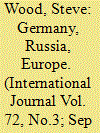

|
|
|
|
|
| Summary/Abstract |
The German and Russian nations share a long relationship. They fought the largest part of the world’s largest ever war. Resonances of that conflict and the Cold War that followed it still permeate their contemporary relationship. Under very different political systems, however, “history” is interpreted and responded to very differently. Concern for status and image, as well as geostrategic factors, motivate Russian officialdom’s disputing of the “post-Cold War order.” Germany is viewed as the pivotal state and nation in Europe. Russia seeks to influence Germany’s civil society and political elite in the attempt to obtain favourable policy outcomes. Sympathy for the Russian position within Germany is outweighed by disquiet regarding Russian foreign policy adventurism and its authoritarian regime more generally.
|
|
|
|
|
|
|
|
|
|
|
|
|
|
|
|
| 4 |
ID:
155774
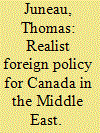

|
|
|
|
|
| Summary/Abstract |
Canada’s policies in the Middle East receive large amounts of media attention, but there is surprisingly little scholarly work about them. Of the few studies on the topic, moreover, most focus on analyzing past or current policies. This is certainly useful, but there is virtually no academic work focused on prescription. There is, as such, a need for theoretically informed studies laying out the rationale for a sound Canadian policy framework for the region. In this context, this paper proposes to look at Canada’s Middle East policies from a realist perspective. What are Canada’s interests? How should these translate into policy? The goal here is not to make specific prescriptions regarding each conflict or bilateral relation, but rather to propose a comprehensive framework to guide Ottawa’s broad approach to the Middle East.
|
|
|
|
|
|
|
|
|
|
|
|
|
|
|
|
| 5 |
ID:
155772
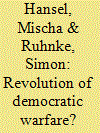

|
|
|
|
|
| Summary/Abstract |
Armament policies are determined by domestic rather than international politics according to liberal IR perspectives. More specifically, military transformation processes in democratic countries are understood as being informed by the political need to limit the number of casualties during military operations. Consequently, liberal scholars assume a distinct democratic eagerness to resort to precision-guided munitions, drones, or even cyber attacks. Our analysis challenges this explanation of democratic armament policies. We evaluate the timing and programmatic choices of armament policies of 33 countries, democratic and non-democratic, combining different indicators of information technology procurement and usage by national militaries. Based on this data, countries are categorized into Revolution in Military Affairs leaders, uppers, followers, stragglers, entrants, and non-participants. Finally, we test the explanatory power of two competing independent variables, representing casualty shyness versus capability-based explanations of military transformation processes. Our results show that realist assumptions yield strong correlations, while liberal assumptions do not produce statistically significant results.
|
|
|
|
|
|
|
|
|
|
|
|
|
|
|
|
| 6 |
ID:
155769
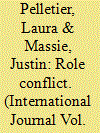

|
|
|
|
|
| Summary/Abstract |
This paper seeks to understand the peculiarity of the Trudeau government’s decision to withdraw Canadian fighter jets from Iraq and Syria. Most studies have focused on electoral turnover to account for early withdrawal from coalition operations. Yet no study offers a plausible explanation for why a centrist challenger, such as Trudeau, favoured early withdrawal despite public support and alliance pressure for continued involvement, and committed when in power to a bolder and riskier mission while withdrawing valued military assets from coalition operations. Building on foreign policy role theory, we argue that role conflict best explains the particularity of the Trudeau government’s withdrawal decision. In the wake of the 2015 federal election, the Liberal Party of Canada witnessed an intra-party conflict over which role to perform between that of a faithful ally and a good international citizen. The party leader finally proposed a compromise mission making Canada more involved on the frontlines.
|
|
|
|
|
|
|
|
|
|
|
|
|
|
|
|
| 7 |
ID:
155775
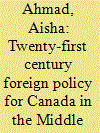

|
|
|
|
|
| Summary/Abstract |
The security crises facing the Middle East and North Africa are among the most complex and volatile in the world today. These protracted conflicts are shaped by a range of catalysts, including state failure, environmental stress, entrenched criminal war economies, ethnic and tribal hostilities, and ideological extremism. Not only are these highly fragmented conflicts, but the multiple actors in each of these theatres also have transnational linkages that trigger contagion effects across state borders. To understand these new twenty-first century security crises, scholars and policy practitioners alike require modern analytical tools. Gone are the days when Canadian foreign policy experts could rely on classic state-based models to explain and predict global violence. To address these contemporary challenges, Canada must adopt a forward-looking approach to the Middle East and North Africa, which does not shy away from the compound and multidimensional challenges that these complex environments present.
|
|
|
|
|
|
|
|
|
|
|
|
|
|
|
|
|
|
|
|
|